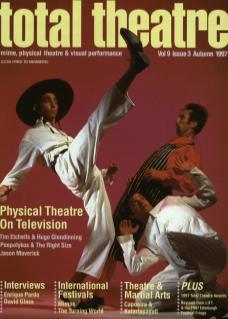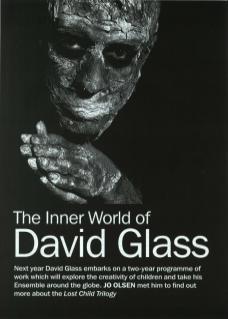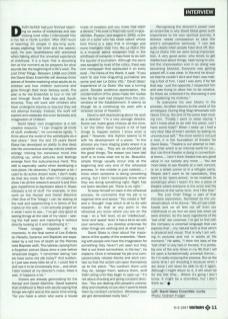David Glass had just finished teaching six weeks of workshops and was looking tired when I interviewed him in his flat in North London. After 200 hours of teaching 25 people in day-long workshops exploring the child and the adolescent, he was nevertheless still animated when talking about the universal experience of childhood. It is a topic that is absorbing him at the moment as he prepares for what sounds like the beginning of a life's work, The Lost Child Trilogy. Between 1998 and 2000 the David Glass Ensemble will develop three pieces of theatre exploring what adults do to children and how children overcome and grow through their inner fantasy world. The plan is for the Ensemble to tour in the UK and through South East Asia and South America. They will work with children who have undergone trauma or loss but they will not attempt therapy. Instead, the work will explore and celebrate the inner fantasies and imagination of children.
David Glass' own imagination is a rich creative resource. ‘I can imagine all kinds of stuff, endlessly,’ he comments lightly. ‘I think about the world of the archetypes as a real place.’ Over the last 25 years David Glass has developed an ability to dive deep into his unconscious and tap into its creative energy, tricking his conscious mind into shutting up, whilst pictures and feelings emerge from the subconscious mind. This skill is especially useful when developing a new piece. He observes, ‘I daydream a lot. I used to do active dream work, I don't really do that any more. But when I'm creating a show I do all the research around it and then give myself time to daydream about it. Music releases a lot of stuff. For example, in this work on The Hansel and Gretel Machine (Part One of The Trilogy) I can be staring at the wall and experiencing it in terms of the marks on the wall... I can actually project on it what I want to see... I've got very good at seeing things at the side of my vision – seeing the half seen and capturing it without directly looking at it and destroying it.’
These images reappear at key moments. In the final scene of Les Enfants du Paradis, Garance and Baptiste are separated by a red line of death as the Pierrots hold Baptiste aloft. This tableau sprang from a forgotten picture Glass drew a year before rehearsals began. ‘I remember asking “can we have some red silk today?” And suddenly I just saw every little bit of it. I could feel it and see it to be emotionally true... and when I later looked at my director's notes, there it was. It happens a lot.’
Visions are already germinating for The Hansel and Gretel Machine. David explains that childhood is filled with adults saying that things are right and at the same time wrong, ‘So you have a witch who owns a house made of sweeties and you make that witch a dentist.’ His work is filled with such impossibilities. Popeye, last staged in 1993, is the tale of a sailor who has never sailed; whose best friend is a baby that is stronger and more intelligent than him. His La Dolce Vita is a musical about escapism that is the antithesis of escapist; it has more to do with the squalor of journalism. Although the piece was savaged by most of the critics, there was one newspaper that applauded it on every level – The News of the World. It said: ‘If you want to see how disgusting journalists are come and see La Dolce Vita.’ David Glass’ experience of La Dolce Vita was a turning point. Despite audience appreciation, the condemnation of the press made him realise how far his work had strayed from the conventions of the Establishment. It seems as though he is continuing his work with a renewed sense of freedom.
David is self-deprecating about his work as a director: ‘I'm a very average director. Some can make good choices all the time. I, on the other hand, require a lot of bad things to happen before I know what is good.’ However, this rhythm seems to fit with his development of a piece. ‘In the process you have staging posts where it is complete crap... They are as important as the good things. The reason you have bad stuff is to know what not to do. Beautiful, simple things usually occur only at the beginning and very end of the rehearsal process. In the middle is just rubbish... I know when someone is doing something wrong, but I don't necessarily know when they are doing something right. Right has not been decided yet. There is no right.’
To keep himself on track in the rehearsal process, he comments that his job is to organise time and space: ‘You create a “felt” and a “thought” map which is all to do with research, so that at any point in the rehearsal you know where you are on the map – on a "felt” level, on an “intellectual”, “time” and “space” level. It has a lot to do with your sensitivity... you develop antennae for when things are working and at what level.’
David Glass is clear about the importance of the quality of the ensemble. ‘Working with people who have the imagination for something they haven't yet seen but they feel is out there somewhere, is the key,’ he explains. Once in rehearsal his job is to compassionately release blocks and elicit contact so that the actors can open themselves up to the piece. ‘You confront them until they do, badger them, seduce them, shift them along until they begin to open up.’ It's not about shouting and giving constant direction. ‘You are dealing with people's vulnerability and creativity so you don't want to block them by constant correction. Otherwise people get demoralised really fast.’
Recognising the director's power over an ensemble is why David Glass gives such importance to his own spiritual journey. A director needs compassion to take the actor's perspective seriously. ‘I can see quite clearly when people have shut off. During La Dolce Vita we were doing improvisation. A very good actor, who tends to get intellectual about things, kept trying to control the improvisation and in so doing was becoming blocked. Everyone was getting pissed off, it was clear. In the end he shouted that he couldn't do it and that I was making a fool of him. I said I was sorry if he felt that way – just the opposite, I respected him and was trying to allow him to be creative. So there we unlocked it by discussing it and by explaining my motives.’
To overcome his own blocks in the process, he often returns to the world of the archetypes. During King Stag rehearsals with Opera Circus, the end of the piece kept eluding him. ‘Finally I went to sleep saying “I don't know what to do with the piece, can I have some help?” When I woke up I had a very clear idea of what I wanted, by asking my unconscious self.’ The inner world is not just a tool, it is the foundation of theatre for David Glass. ‘Theatre is our attempt to literalise that which is an internal world for us... But I do think theatre is dying in conventional terms... I don't think theatre has any great value in our society any more... You are more likely to see theatre at a rock concert, or on a street corner or in a refugee camp. People don't want to be spectators, they want to be “spect-actors”, to be involved. In workshops when I teach it's like a piece of theatre where everyone is the actor and the audience at the same time. And I like that.’
The Lost Child Trilogy is part of that inclusive exploration, facilitated by the universal nature of its theme. ‘We all had childhoods and we all feel cut off from our childhoods or we feel we were lost when we were children. So the basic ingredients of the “lost child” are universal. I've got to find with the company a universal language that can express that... my natural bent is that which is physical and visual. That is why I am writing in pictures and not in words at the moment.’ He adds, ‘I think the idea of the “lost child” is very rare in theatre. It is probably one of the only times in my life that I will hit upon a fundamentally universal theme... So I'm really enjoying the process. But at the same time I am dreading it because when I am done I will never be able to do it again. Although I might return to it, it will never be for the first time... Where it's going I don't know. It might be a shambles, but I don't think so.’


